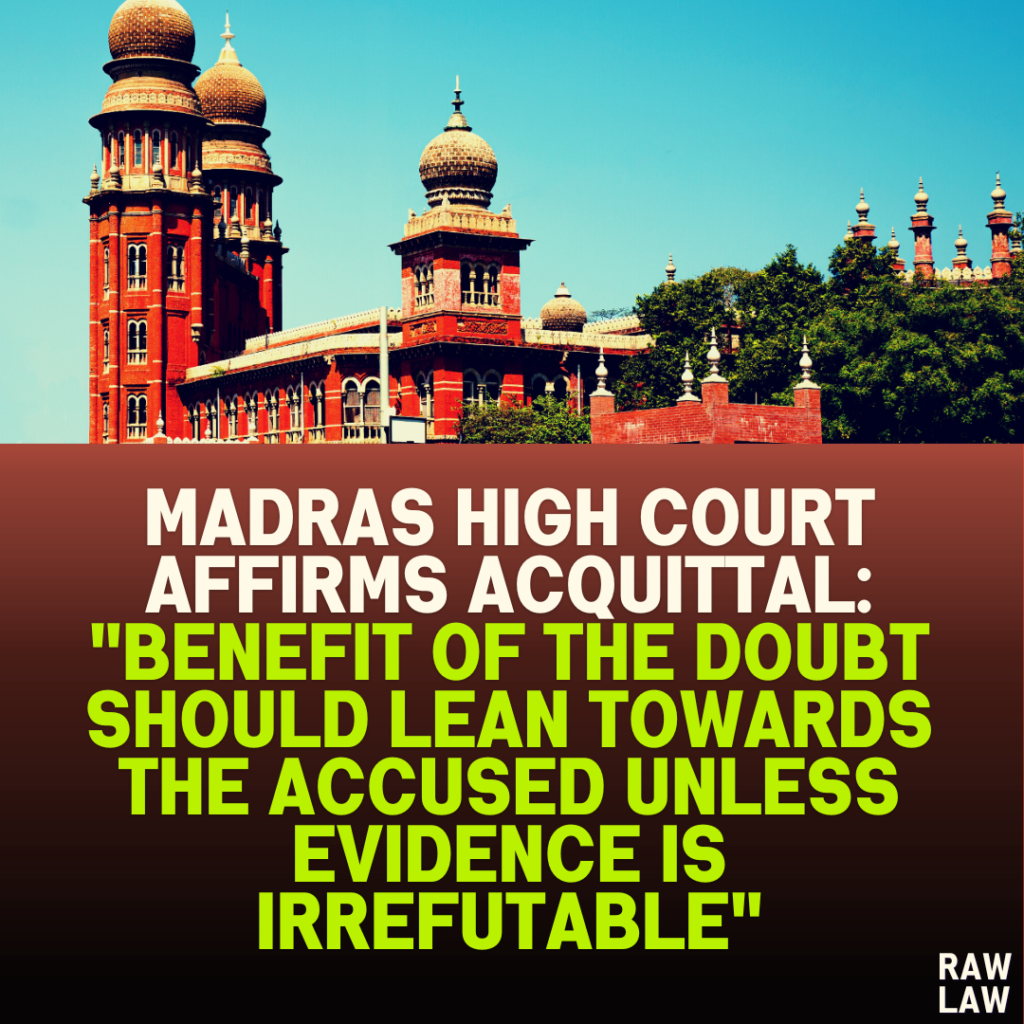Court’s Decision:
The Madras High Court dismissed the Criminal Appeal filed by the defacto complainant, affirming the order of acquittal passed by the Trial Court. The court emphasized that in cases of acquittal, the presumption of innocence is further fortified and that the appellate court should not interfere unless the trial court’s findings are perverse or wholly unreasonable.
Facts:
The appellant, the son of the deceased and brother of the first accused, filed the present appeal against the order of acquittal. The dispute stemmed from a familial disagreement between the appellant and the first accused over a shared amount of Rs. 700. On July 25, 2010, an altercation occurred where the first and second accused allegedly attacked the deceased, resulting in his death. The appellant claimed that the first accused struck the deceased with a wooden log while the second accused hit him on the face, causing fatal injuries. The deceased was pronounced dead upon arrival at the hospital. Following the incident, an FIR was registered, and the case proceeded under Sections 323 and 302 IPC.
Issues:
- Whether the evidence presented by the sole witness (the appellant) was sufficient to overturn the acquittal order.
- Whether the Trial Court erred in giving the accused the benefit of the doubt.
Petitioner’s Arguments:
The appellant contended that his testimony should be given due credence as he was an injured eyewitness present at the time of the occurrence. He argued that the Trial Court erred in disbelieving his version solely based on the minor inconsistencies in his statements and the lack of corroboration from other independent witnesses.
Respondent’s Arguments:
The respondents argued that the trial court’s decision was legally sound and emphasized that the prosecution had failed to establish the guilt of the accused beyond reasonable doubt. The counsel for the respondents pointed out that the appellant’s evidence was inconsistent and there was no motive attributed between the deceased and the accused. It was also submitted that the accused had sustained injuries in the incident, indicating the possibility of a different sequence of events.
Analysis of the Law:
The court reiterated that the principles governing an appeal against an acquittal are distinct from those applicable to an appeal against conviction. The appellate court must be cautious while re-appreciating evidence and should interfere only if there is a clear illegality or error in law or facts. The court referred to the Supreme Court’s guidelines in Mallappa and Others vs. State of Karnataka (2024), underscoring that when two plausible views exist, the one favoring the accused must prevail.
Precedent Analysis:
The judgment referred to the Supreme Court decision in Ravi vs. State Represented by Inspector of Police [(2008) 15 SCC 115], which held that a sole testimony can form the basis for conviction if it is found cogent and reliable. However, the court noted that in the present case, the testimony of the sole witness (P.W.1) was riddled with doubts and inconsistencies.
Court’s Reasoning:
The court held that P.W.1’s testimony could not be considered wholly reliable due to the existence of a prior enmity and the lack of corroborative evidence. The presence of 20 to 30 witnesses at the scene, none of whom supported P.W.1’s version, cast further doubt on the prosecution’s case. The court found that the appellant’s testimony was not sufficient to establish the guilt of the accused beyond reasonable doubt.
Conclusion:
The court concluded that the findings of the Trial Court were plausible and that the acquittal order did not suffer from any perversity or legal infirmity. Consequently, the appeal was dismissed, affirming the benefit of doubt in favor of the accused.
Implications:
This ruling reinforces the principle that in criminal cases, the burden of proof lies heavily on the prosecution. Unless the evidence is strong, clear, and reliable, the benefit of doubt should always tilt in favor of the accused. The judgment serves as a reminder of the high threshold required to overturn an acquittal and the need for comprehensive corroborative evidence in cases resting on solitary testimony.
